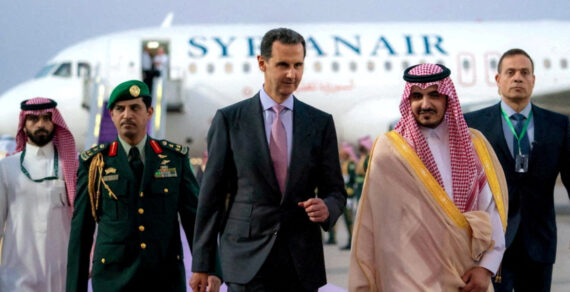
‘Betrayed and let down’: Syrians react as Assad welcomed back to Arab fold
WHIA- Washington Post
Story by Adela Suliman, Missy Ryan
“The international community has failed us completely.”
That was the assessment of Razan Saffour, 30, a British Syrian human rights activist who was among the many watching in disbelief and anger Friday as Syrian President Bashar al-Assad was welcomed on an international stage — returning to the Arab League after an 11-year suspension.
While the league has limited political power, Assad’s attendance at the regional summit was a major symbolic triumph for the former political pariah, whose forces have been accused of using chemical weapons and targeting hospitals and civilian areas during a bloody civil war that has lasted more than a decade and is still ongoing.
Gulf nations were among those who had previously backed efforts to train and arm rebel factions seeking to overthrow Assad. However, Assad has since reclaimed control over much of the country with the help of Iran-backed militias and Russian air power, and some Arab countries have resumed diplomatic relations.
For many Syrians affected by the conflict, Assad’s rehabilitation made them feel not only betrayed but as if their suffering from the civil war had been erased from the region’s memory completely.
“Instead of holding Assad accountable for his heinous crimes … he is welcomed and even rewarded, as if the past 12 years of suffering and bloodshed never occurred,” said Wafa Ali Mustafa, 32.
Mustafa, who fled Syria for Germany when her country was plunged into civil war after the Arab Spring uprisings, said her father, Ali Mustafa, a fruit seller, was forcibly disappeared by Assad’s regime in July 2013.
The last time she and her three siblings saw their dad, he was being removed for their Damascus home, she said. “Normalizing relations is a betrayal to the victims and their families, including my own family. … Normalization can bring no peace.”
Saudi Arabia’s Crown Prince Mohammed bin Salman opened the summit acknowledging the “painful years of struggle” in Syria but added that he hoped the country’s rapprochement would bring greater stability to the region. Arab leaders have accused the United States of neglecting the region in favor of a focus on competition with China and Russia, and analysts say this has prompted many countries to hedge their bets.
Many Syrians have described feeling forgotten, as the world’s attention was diverted to other crises, including the coronavirus pandemic and Russia’s invasion of Ukraine, and Syria is no longer considered an American priority.
“It bothers us as Syrians how the international community dealt with the war in Ukraine and the support that was provided to the Ukrainians … compared to the Syrian refugees,” said Haya Atassi, an organizer with a civil society group, referencing Russia’s involvement in both conflicts.
Atassi says her family fled Homs after her brother was detained by government forces and schools closed down. She now lives between Beirut and Istanbul.
Within Syria, protests took place across a number of opposition-held cities on Friday, as people filled the streets to proclaim their outrage at Assad’s participation at the summit.
But some Syrians noted that his reintegration could provide some economic benefits for the nation, which is struggling with sanctions, the aftermath of the earthquake and the coronavirus pandemic.
Pro-Assad social media users hailed Assad’s return as a victory, sharing images of him smiling and shaking hands with fellow leaders. One user on Twitter said he “stood tall” after Arab leaders had “bet on his downfall,” describing the about-turn from Arab states that funded factions to bring him down as a major victory.
Despite Assad’s presence at the event, the Biden administration, like European allies, has vowed to maintain its policy of isolation and pressure against him — noting that the war has resulted in hundreds of thousands of deaths and displaced half the country’s population.
And Qatar, which has feuded with other Gulf states in recent years, said it disagreed with Syria’s re-inclusion in the Arab League but would not pose an “obstacle” to a move backed by regional powers. Reports highlighted that its Emir, Tamim bin Hamad al-Thani, left the summit ahead of Assad’s address.
Arab embrace of Assad underscores divergence with U.S. over Syria
Saffour, who is now based in Doha, remained critical of both Arab and Western nations, saying: “They absolutely could have done so much more.”
Her family from Aleppo and Homs have faced torture, bombardment, imprisonment and home destruction, she said, and relatives who survived now live as refugees in Turkey and Jordan or are contending with the aftermath of a February earthquake that shattered parts of northern Syria.
Despite the world’s attention shifting away, the plight of Syrians still has an impact on the wider world, she added. “Syrians fled Assad … not just a war,” she said, and his political rehabilitation would ensure fewer Syrians would be willing to return home.
Mustafa, who continues to advocate for the return of her father, argued that Assad’s international reintegration also sent a “perilous message” beyond Syria’s borders to other authoritarian leaders.
“We are all vulnerable in a world that overlooks the gravity of war crimes, crimes against humanity, and genocide,” she said.
Syrian activists who spoke to The Post did not express any optimism that the political situation in Syria would improve, with Saffour noting that many Syrians had felt “betrayed and let down” for a very long time.
However, some also described drawing on their shared experiences, as well as their memories of their loved ones, for strength.
“Unfortunately, we received a lot of trauma and learned to depend only on ourselves, and this is what we will do,” Atassi said, adding that the war had bred resilience.
Mustafa, meanwhile, said this of her father: “I cherish the lasting memory of our car rides together … venturing into the mountains for hours on end. Those moments held an indescribable beauty that I carry within me.”
Ellen Francis contributed to this report.
